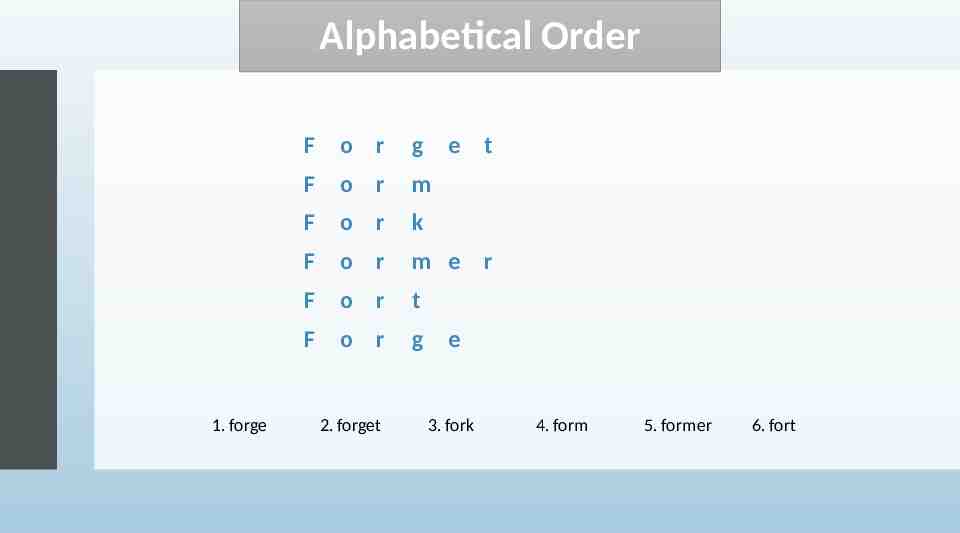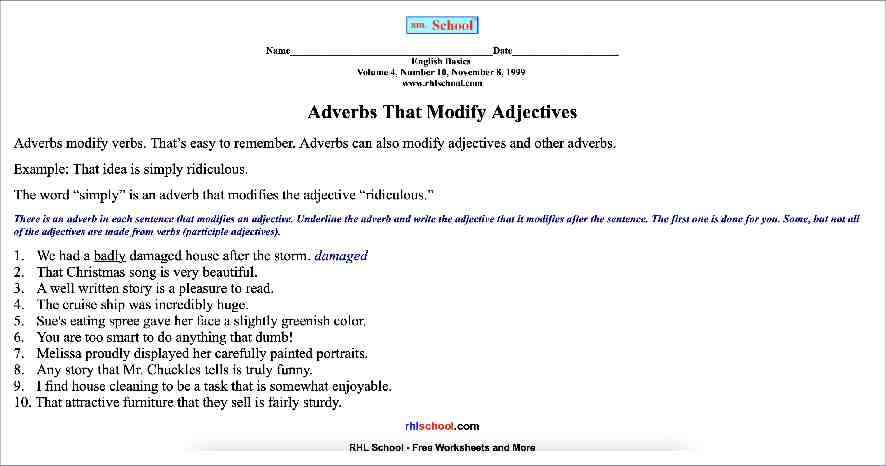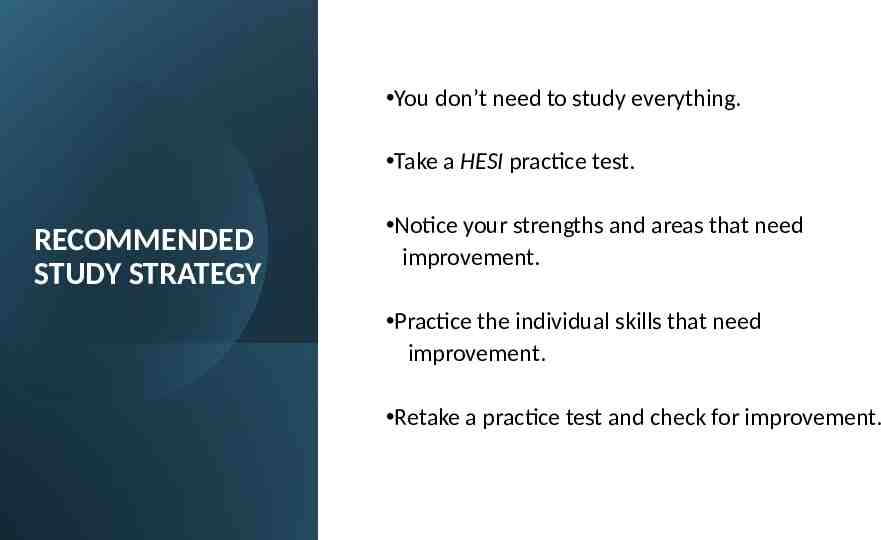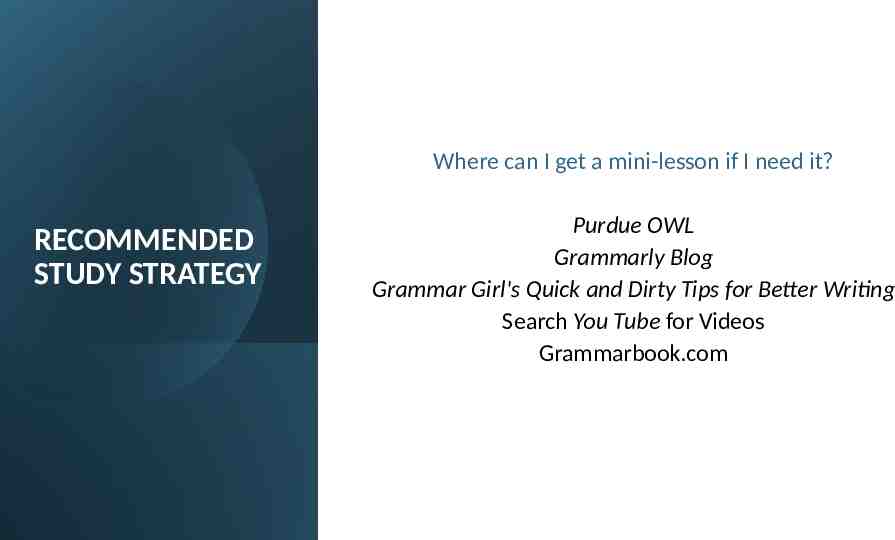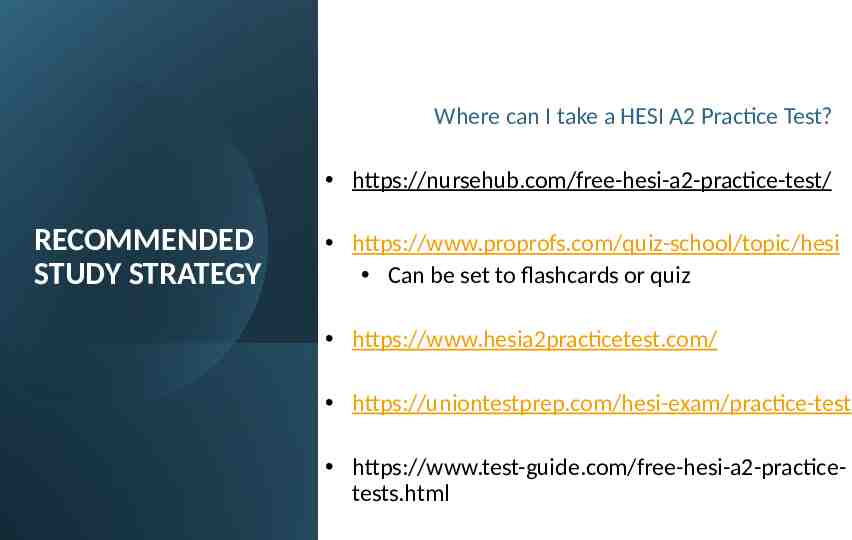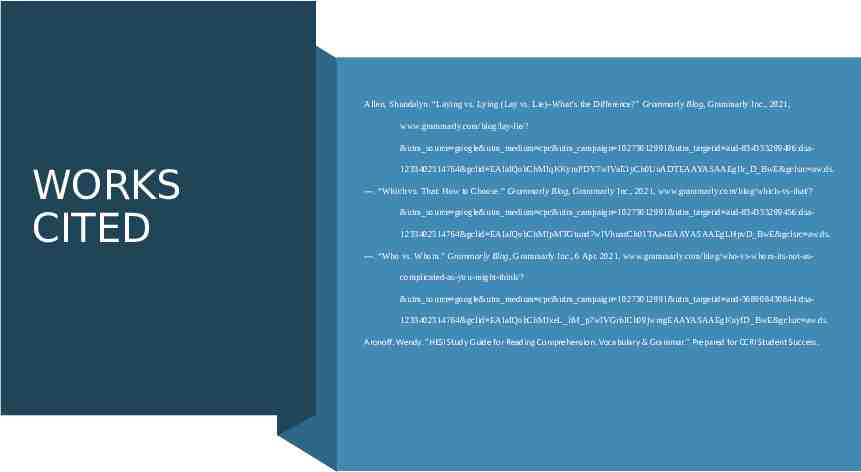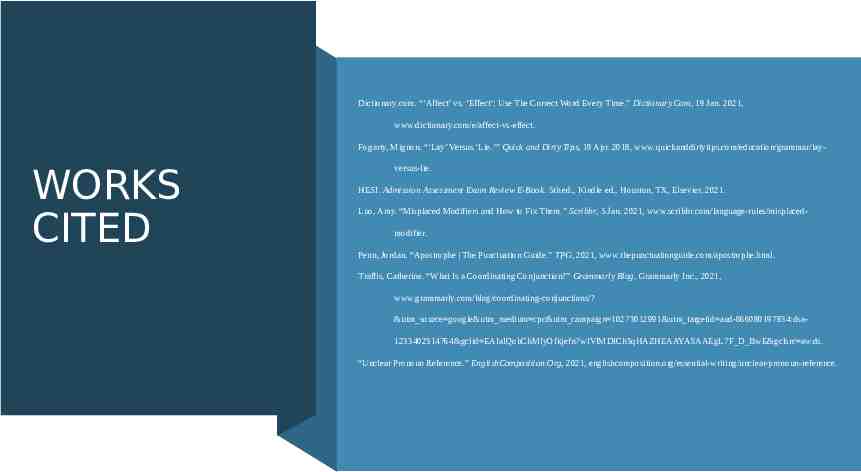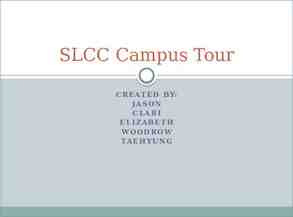HESI A2 OVERVIEW: Grammar
79 Slides1.49 MB

HESI A2 OVERVIEW: Grammar

Workshop Materials PREVIEW About the Grammar Section Troublesome Word Pairs Grammar Conventions Be Familiar With Recommended Study Strategy Works Cited

Materials Needed for this Workshop Pen or pencil Notebook paper 2 Worksheets Troublesome Word Pairs Homework Adverbs that Modify Adjectives Worksheet Notes provided for the Grammar Overview (optional)

About the Grammar Section The questions will be multiple choice. You must answer the questions in the order asked. Once you click next, you cannot go back. Unanswered questions are marked wrong.

Troubleso me Word Pairs

AFFECT or EFFECT? When I Googled tricks to remember affect vs. effect, I learned of RAVEN: R – Remember A – Affect is a V – Verb E – Effect is a N - Noun (USUALLY- there are exceptions) (Dictionary.com)

Lie or Lay? HINT: Think recLIne with LIe and pLAce with Lay (Allen, “Laying vs. Lying (Lay vs. Lie)–What’s the Difference?”)

Lie or Lay? 1. I would like to down before dinner. a) lay b) lie c) lain d) laid 2. I my books on the table when I arrived home. a) lay b) lie c) lain d) laid 3. After the surgery, the patient in bed for two days. a) lay b) lie c) lain d) laid 4. The island between two peninsulas. a) lies b) lays

Which or That? 1. They saw three beds, had sheets on them, when they looked in the room. (which/that) 2. The nurse needed a bed had sheets on it. (which/that) That is used with defining clauses - information that is necessary to the sentence (Allen, “Which vs. That: How to Choose”). Which is used with non-defining information. Its clause can be removed and not effect the meaning of the sentence (Allen, “Which vs. That: How to Choose”). “Which” statements are separated by commas.

Who or Whom? Who will be meeting me at the airport? Matt will be meeting you at the airport. Who is used as the subject of a sentence. Use “who” if the question will be answered with: I, he, she, we, they. Whom is the object of the sentence. Use “whom” if the question will be answered with: me, him, her, us, them. (Allen, “Who vs. Whom”) My father will be meeting you at the airport. He will be meeting you at the airport. To whom am I giving my textbook? You are giving your textbook to Sara. You are giving your textbook to my sister. You are giving your textbook to her.

. HOMONYMS HOMOPHONES HOMOGRAPHS Homographs are words of like spelling but with more than one meaning or pronunciation 1. The bandage was wound around the wound. 2. The farm was used to produce produce. 3. The dump was so full that it had to refuse the refuse. 4. The insurance was invalid for the invalid. 5. The nurse had to subject the volunteer subject to a series of subjective questions. 6. A seamstress and a sewer fell into the sewer line!

GRAMMAR CONVENTIONS Fragments Run-ons Subject-Verb Agreement Commas Apostrophes Pronouns Misplaced Modifiers

SENTENCE or FRAGMENT? Find the complete sentence. 1. During the thunderstorm. SENTENCE FRAGMENTS 2. While the doctor examined me. 3. Watch out for that branch. 4. After I checked my son’s temperature. HINT: Look for the complete thought.

RUN-ON SENTENCES You might see questions like this: Which of these is incorrect? 1. The dean arrived early to the event; she was scheduled to speak. 2. The dean arrived early to the event, she was scheduled to speak. 3. The dean arrived early to the event. She was scheduled to speak. 4. The dean arrived early to the event: she was scheduled to speak.

There are several ways to correct a run-on sentence. RUN-ON SENTENCES You might see questions like this: Class is at 11:00, it is being held in the auditorium. 1. Divide it into separate sentences. Class is at 11:00. It is being held in the auditorium. 2. Add a comma and coordinating conjunction to join them. Class is at 11:00, and it is being held in the auditorium. 3. If they are very closely related, use a semi-colon, colon or dash to join them. Class is at 11:00; it is being held in the auditorium. Class is at 11:00:it is being held in the auditorium. Class is at 11:00-it is being held in the auditorium. (HESI. 62)

In a sentence the subject and verb must agree in number. SUBJECT-VERB AGREEMENT If the subject is singular, the verb must be singular. The patient needs a bed. If the subject is plural, the verb must be plural. The patients need beds. (HESI. 61)

SUBJECT-VERB AGREEMENT 1. The patient with the bandaged hands a bed. a) needs b) need 2. The staff in a meeting. a) is b) are 3. The doctor to his patients. a) listens b) listen 4. Neither the students nor the professor the new technology. a) understands b) understand

IN A SERIES You might see questions like this: COMMAS Which of these is correct? 1. Jesse enrolled in algebra, biology, and psychology classes. 2. Jesse enrolled in algebra, biology and psychology classes. 3. Jesse enrolled in algebra biology and psychology classes. 4. Jesse enrolled in algebra, biology, and, psychology classes.

COMMAS IN A SERIES Be sure place a comma between items in a series and before the conjunction (and, or) to prevent confusion (HESI. 63). IN NURSING YOU MUST PLACE A COMMA BEFORE “AND” IN A LIST OF MEDICATIONS TO DIFFERENTIATE BETWEEN THEM.

IN A COMPOUND SENTENCE You might see questions like this: COMMAS Which of these is correct? 1. I needed groceries but I couldn’t get to the store. 2. The stores were closed, so I ordered online. 3. The neighbors were away; so they set their alarm. 4. We served chicken for supper and we had dessert.

COMMAS IN COMPOUND SENTENCES To remember coordinating conjunctions used to combine 2 sentences, think FANBOYS. For And Nor But Or Yet So (Traffis)

1. Which pronoun will best replace the underlined words? The fans sat on the bleachers during the football game. a)He b) They c) Them d) We PRONOU NS 2. Which sentence is correct? b)Joe and me saw a movie. c)Joe and I saw a movie. d)Me and Joe saw a movie. e)I and Joe saw a movie. 3. The manager asked the employee to give a copy of license. a) her, me b) him, his c) he, her d) her, mine 4. Which sentence is correct? a) The children lost their ball. b) The children lost there ball.

COMMON MISTAKES POSSESSIVE PRONOUNS NEVER HAVE AN APOSTROPHE PRONOU NS my/mine your/yours his her/hers it/its our/ours whose your/yours their/theirs Often Confused: Pronouns Contractions Its It’s - it is/it has Their they’re – they are Your you’re – you are Whose who’s - who is/who has (HESI. 63)

UNCLEAR REFERENCE Can you determine to which noun the pronoun is referring? PRONOU NS 1. I watched them as they examined the patient. Who are “they”? Correction: I watched the residents as they examined the patient. “They “refers to the residents. 2. The patient and his social worker were admiring his book. Whose book? The patient’s or the social worker’s? Correction: The patient and social worker were admiring the patient’s book.

UNCLEAR REFERENCE PRONOU NS 1. Which sentence is unclear? a) Tim told James that he should clean his car. b) The doctor and the patient waited for the patient’s test results. c) Sue told Jan that Sue should go to the dentist. d) The professor and his assistant cleaned the professor’s lab. 2. Why is it unclear?

APOSTROPH ES You might see questions like this: IN CONTRACTIONS An apostrophe is used in place of omitted letters as in contractions do not don’t I will I’ll could have could’ve they are they’re We sometimes use an apostrophe in place of omitted numbers too. 2020 ‘20 1998 ’98 (HESI. 63)

APOSTROPHES IN CONTRACTIONS Write the contraction for the following words: they are cannot I have it is you are will not I would who is
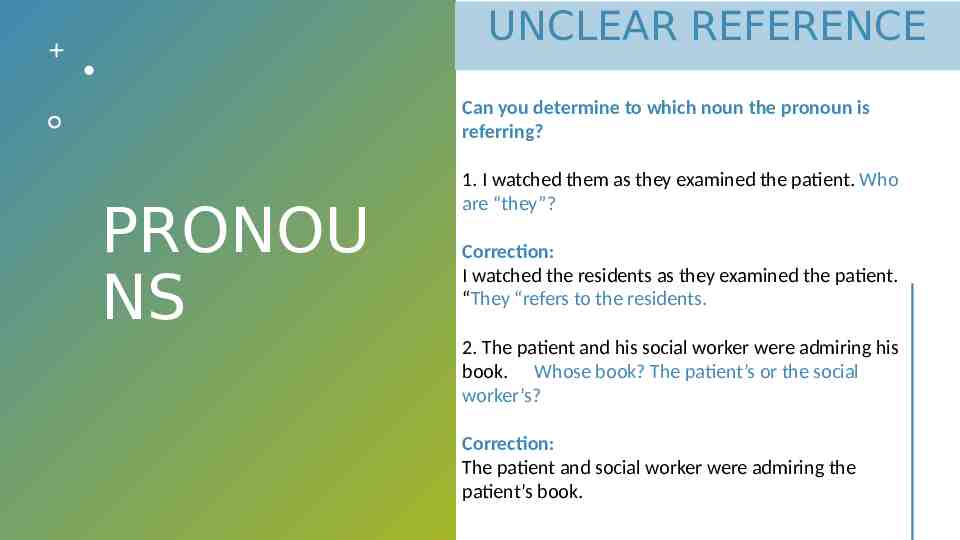
APOSTROPHES IN CONTRACTIONS Write the contraction for the following words: they are cannot I have it is they’re you are will not I would who is

APOSTROPHES IN CONTRACTIONS Write the contraction for the following words: they are they’re you are cannot can’t will not I have I would it is who is

APOSTROPHES IN CONTRACTIONS Write the contraction for the following words: they are they’re you are cannot can’t will not I have I would it is I’ve who is
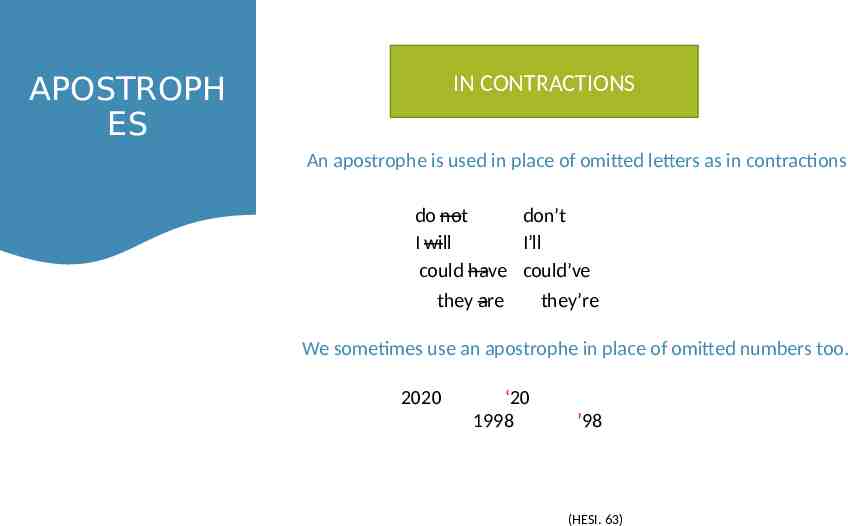
APOSTROPHES IN CONTRACTIONS Write the contraction for the following words: they are they’re you are cannot can’t will not I have I would it is I’ve it’s who is
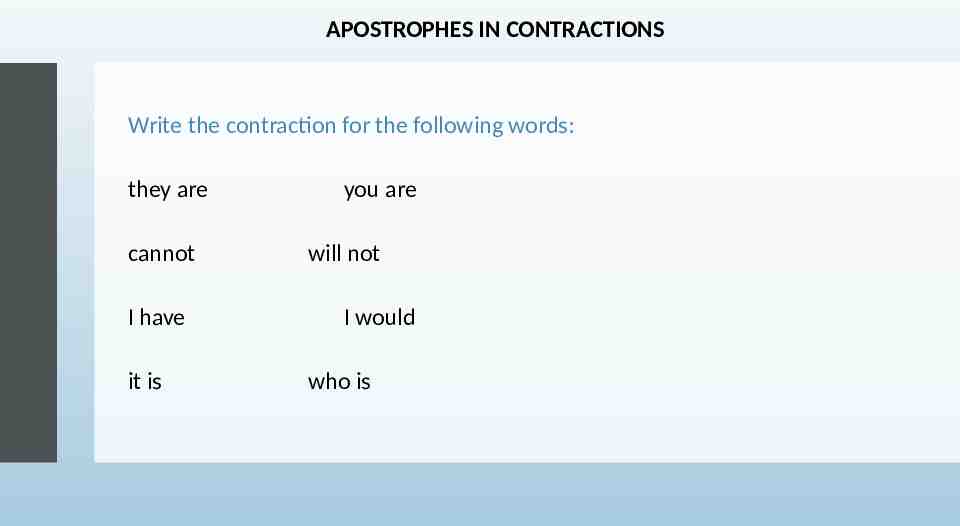
APOSTROPHES IN CONTRACTIONS Write the contraction for the following words: they are they’re you are cannot can’t will not I have I would it is I’ve it’s who is you’re
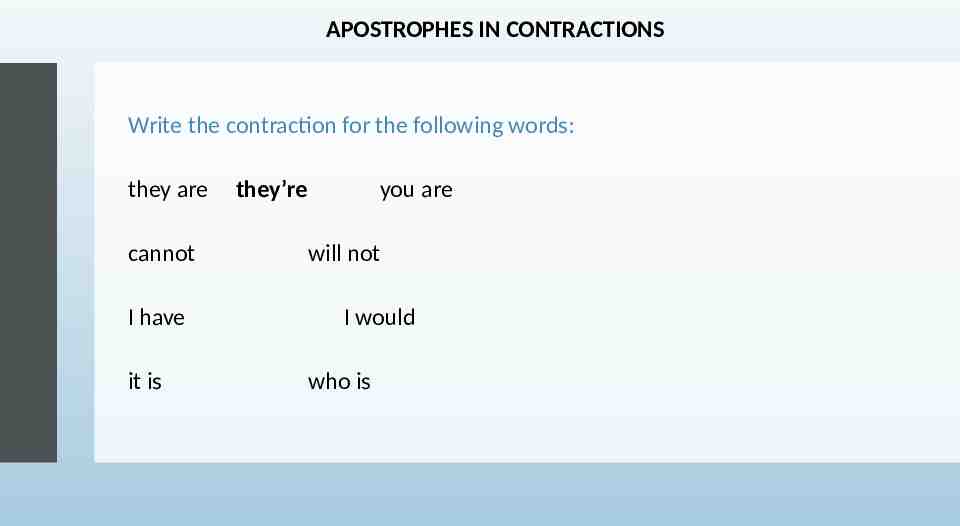
APOSTROPHES IN CONTRACTIONS Write the contraction for the following words: they are they’re you are cannot can’t will not I have I would it is I’ve it’s who is you’re won’t
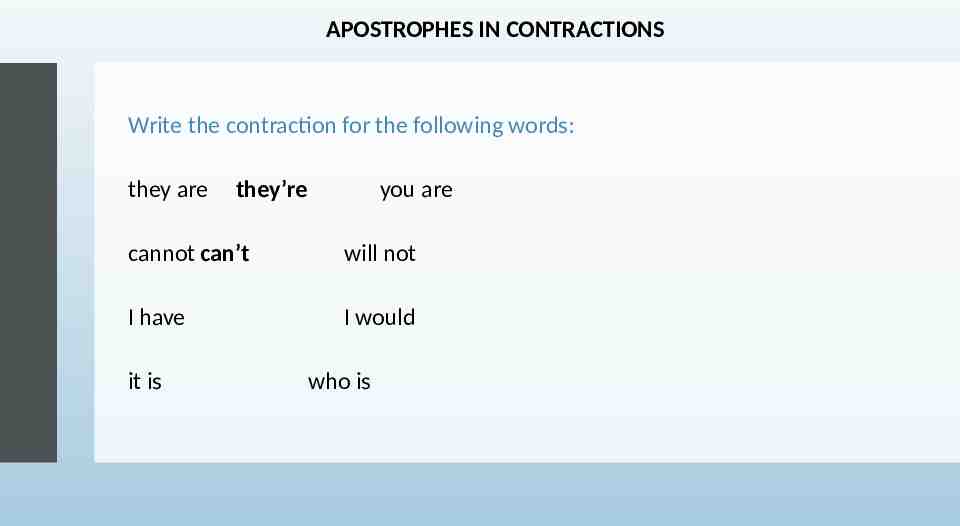
APOSTROPHES IN CONTRACTIONS Write the contraction for the following words: they are they’re you are you’re cannot can’t will not won’t I have I would I’d it is I’ve it’s who is
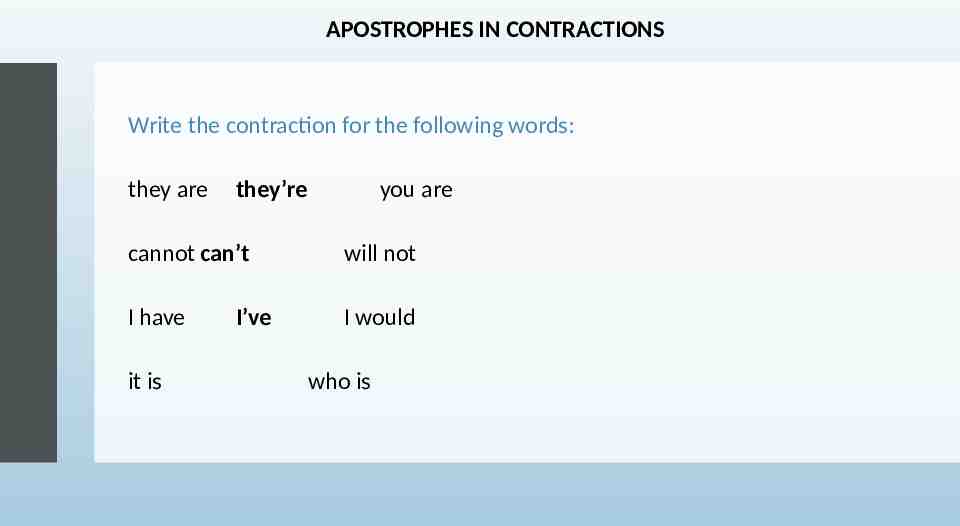
APOSTROPHES IN CONTRACTIONS Write the contraction for the following words: they are they’re you are you’re cannot can’t will not won’t I have I would I’d it is I’ve it’s who is who’s
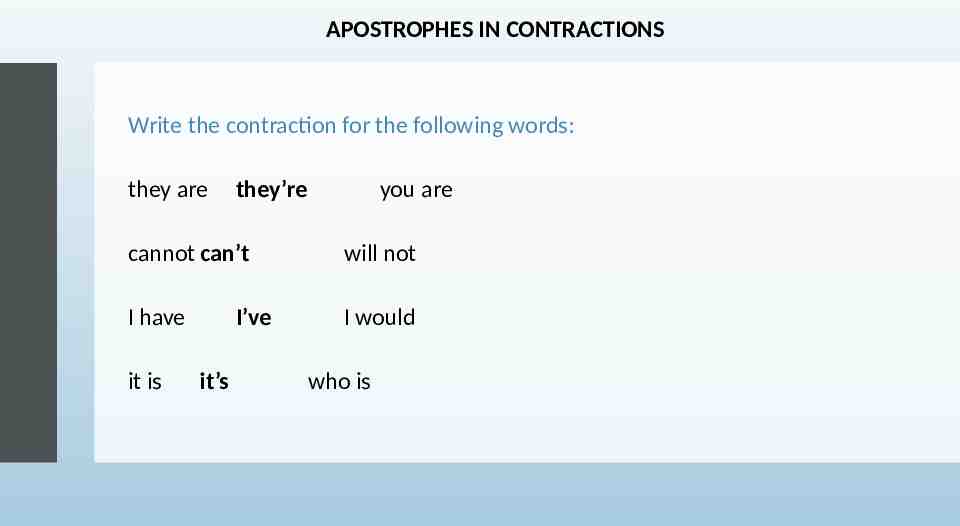
TO SHOW POSSESSION APOSTROPH ES You might see questions like this: An apostrophe is used to show possession or ownership of a noun. If the word is singular or a plural not ending in –s, add ‘s to the end of the word (Penn). child’s book class’s lab children’s books James’s bed Thomas’s shirt men’s hats If the word is plural and ends with -s, add only an apostrophe to the end of the word (Penn). classes’ labs doctors’ orders the Jameses’ car ------------------------------------------------------------------------------------------------------ Jim and Cheryl’s house mother-in-law’s appointment sister-in-law’s chart
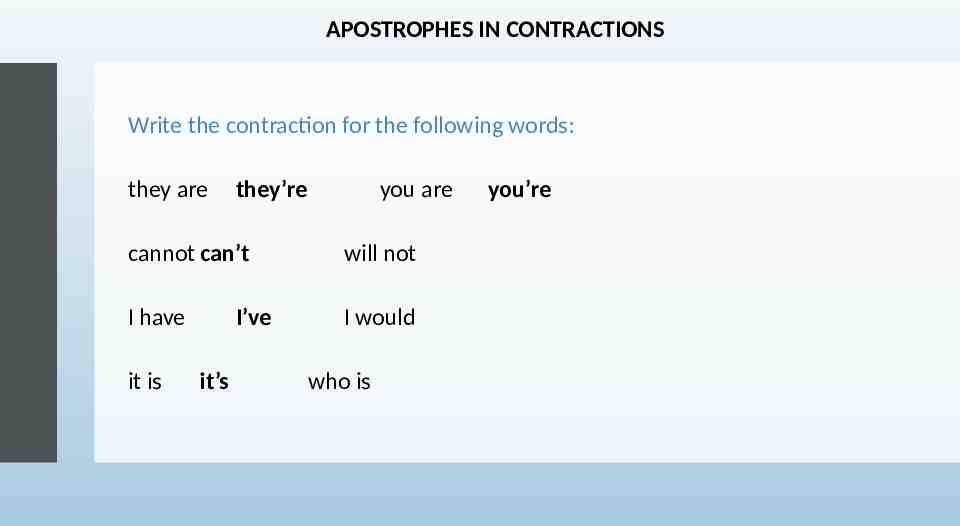
APOSTROPHES TO SHOW POSSESSION Write each of these words and names in singular possessive form. SINGULAR SINGULAR POSSESSIVE Smith book person Davis Perez calf AN APOSTROPHES IS NEVER USED TO MAKE A WORD, NAME, OR NUMBER PLURAL (HESI. 63)
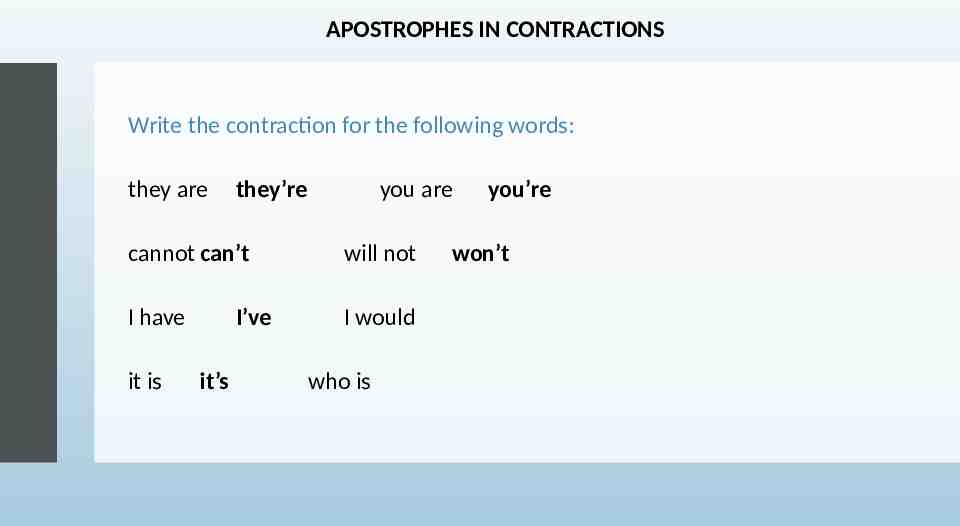
APOSTROPHES TO SHOW POSSESSION SINGULAR SINGULAR POSSESSIVE Smith Smith’s book book’s person person’s Davis Davis’s Perez Perez’s calf calf’s AN APOSTROPHES IS NEVER USED TO MAKE A WORD, NAME, OR NUMBER PLURAL (HESI. 63)
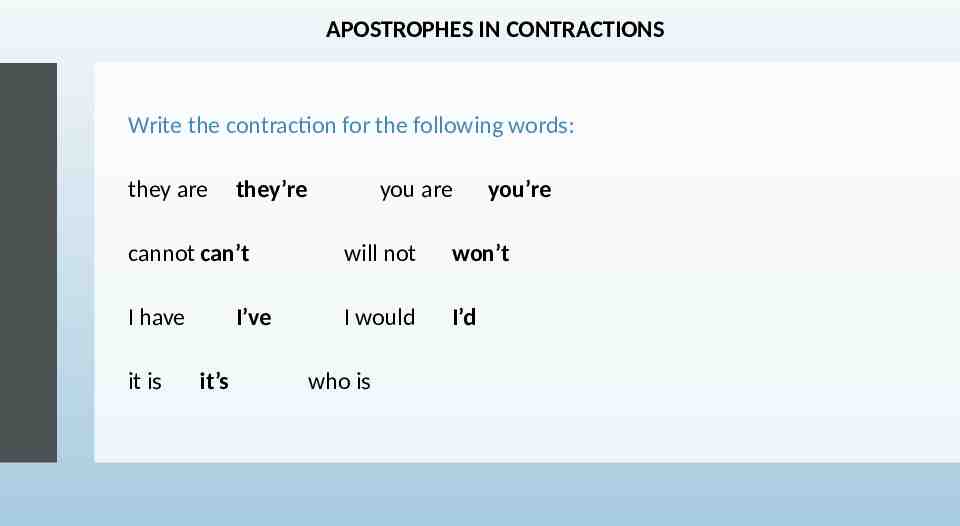
APOSTROPHES TO SHOW POSSESSION Make each of these words and names plural. SINGULAR PLURAL Smith book person Davis Perez calf AN APOSTROPHES IS NEVER USED TO MAKE A WORD, NAME, OR NUMBER PLURAL (HESI. 63)
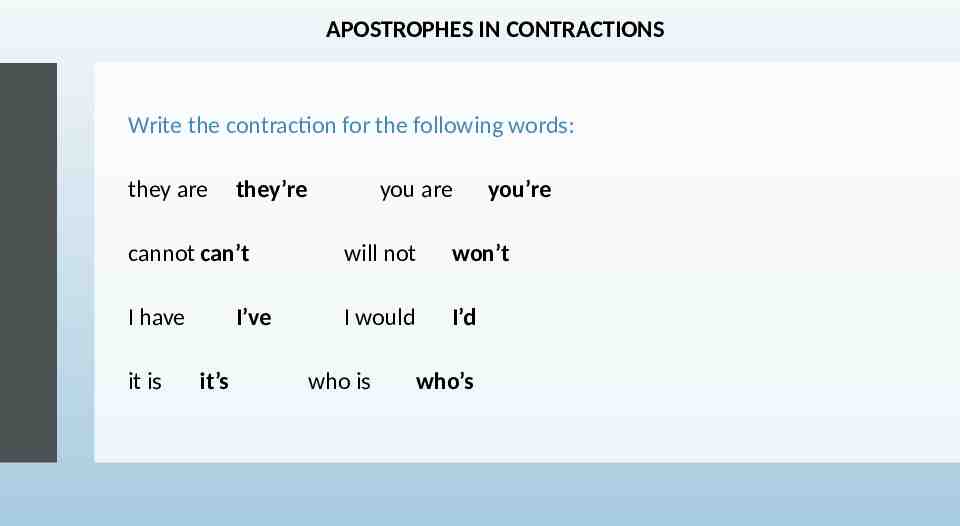
APOSTROPHES TO SHOW POSSESSION SINGULAR SINGULAR POSSESSIVE PLURAL Smith Smiths book books person people Davis Davises Perez Perezes calf calves PLURAL POSSESSIVE AN APOSTROPHES IS NEVER USED TO MAKE A WORD, NAME, OR NUMBER PLURAL (HESI. 63)
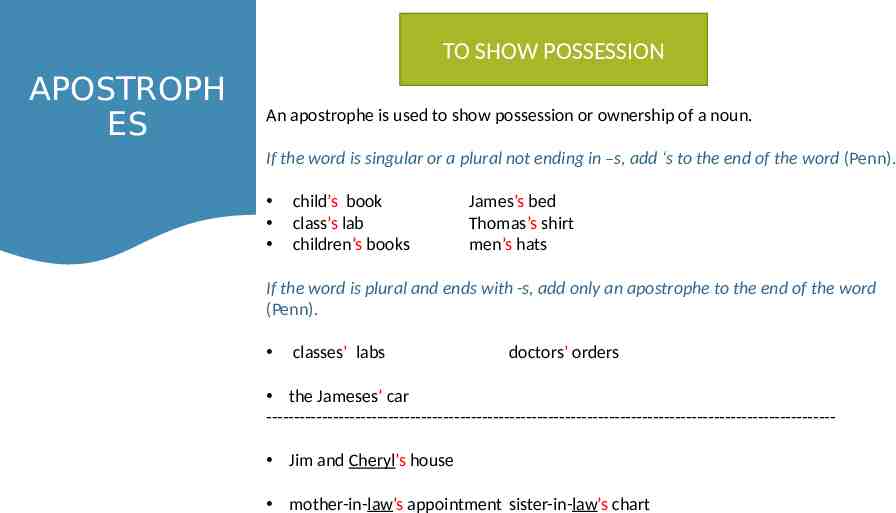
APOSTROPHES TO SHOW POSSESSION Write each of these words and names in plural possessive form. SINGULAR SINGULAR POSSESSIVE PLURAL PLURAL POSSESSIVE Smiths books people Davises Perezes calves AN APOSTROPHES IS NEVER USED TO MAKE A WORD, NAME, OR NUMBER PLURAL (HESI. 63)
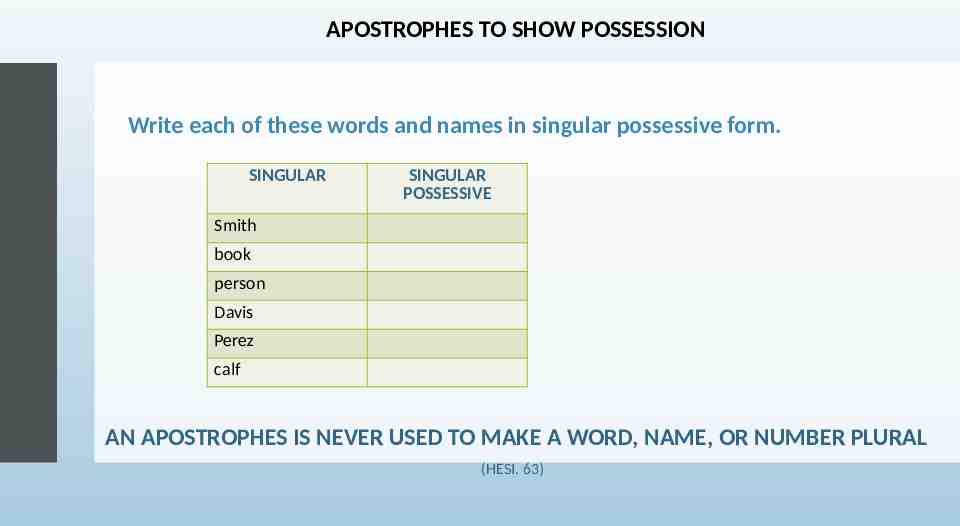
APOSTROPHES TO SHOW POSSESSION SINGULAR SINGULAR POSSESSIVE PLURAL PLURAL POSSESSIVE Smiths Smiths’ books books’ people people’s Davises Davises’ Perezes Perezes’ calves calves’ AN APOSTROPHES IS NEVER USED TO MAKE A WORD, NAME, OR NUMBER PLURAL (HESI. 63)
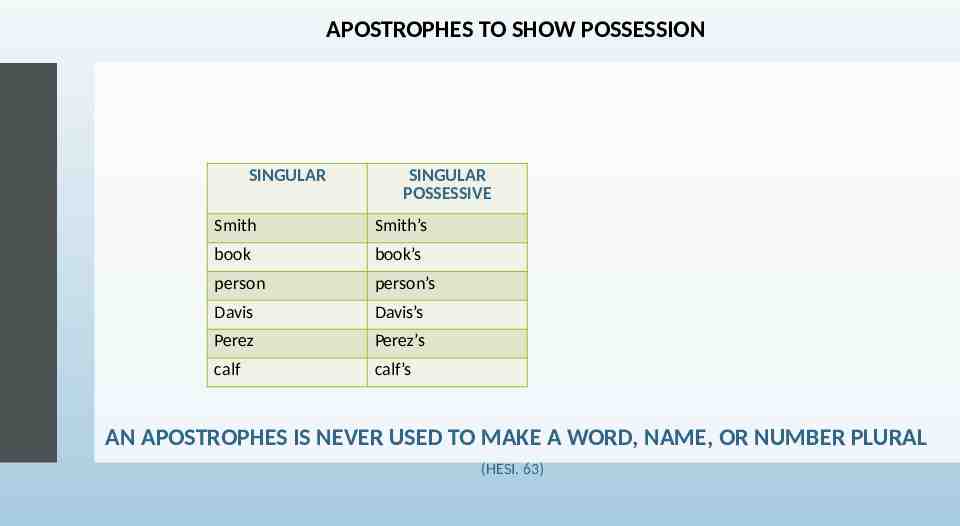
APOSTROPHES TO SHOW POSSESSION SINGULAR SINGULAR POSSESSIVE PLURAL PLURAL POSSESSIVE Smith Smith’s Smiths Smiths’ book book’s books books’ person person’s people people’s Davis Davis’s Davises Davises’ Perez Perez’s Perezes Perezes’ calf calf’s calves calves’ AN APOSTROPHES IS NEVER USED TO MAKE A WORD, NAME, OR NUMBER PLURAL (HESI. 63)
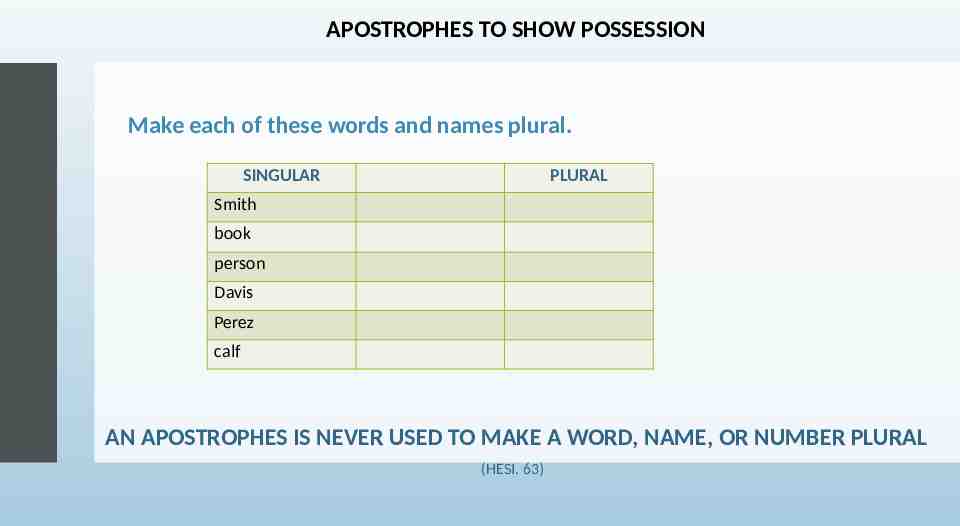
A modifier is misplaced when it is separated from the word(s) it is describing. The cat dropped a mouse on the kitchen floor that was still alive. This reads as though the kitchen floor was still alive. MISPLACED MODIFIERS Correction: The cat dropped a live mouse on the kitchen floor. or The cat dropped a mouse that was still alive on the kitchen floor.
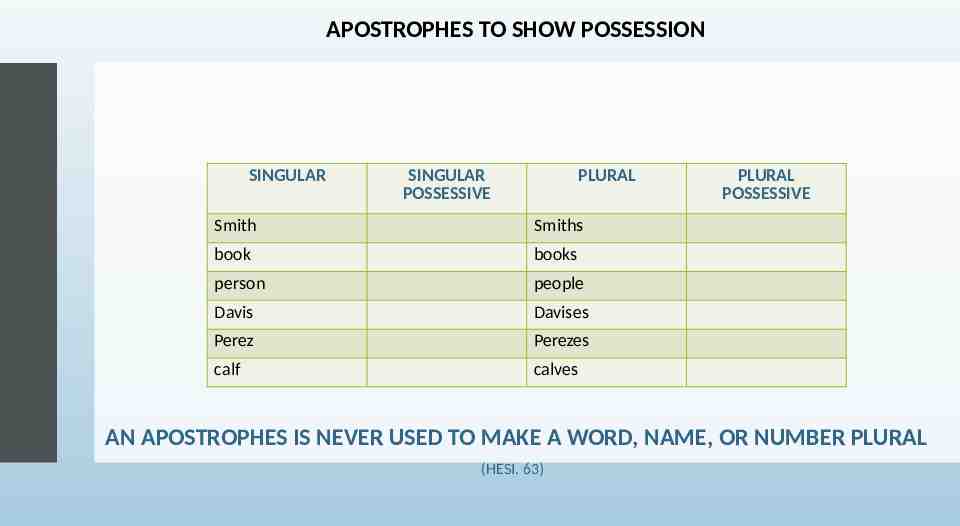
MISPLACED MODIFIERS Is there a misplaced modifier in this sentence? If yes, how would you correct this? Tom served burgers to his guests on paper plates.
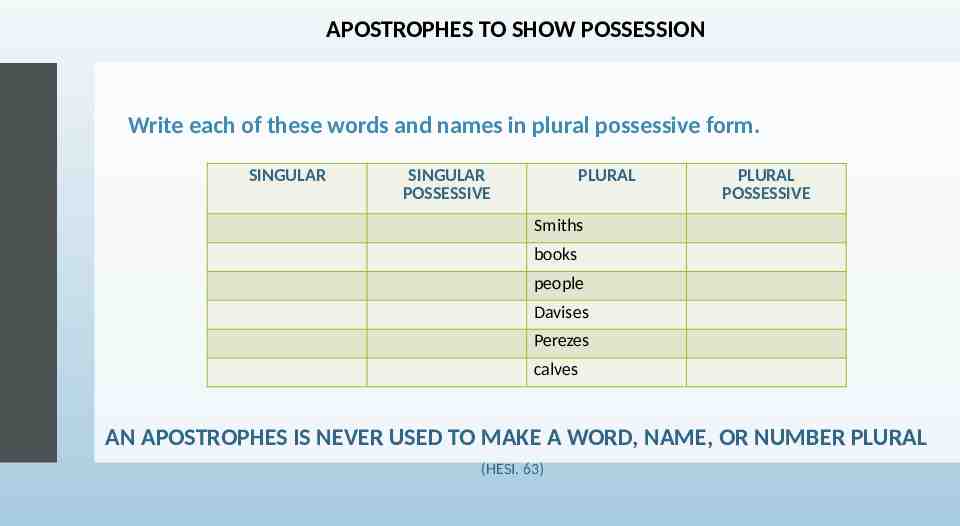
MISPLACED MODIFIERS Is there a misplaced modifier in this sentence? If yes, how would you correct this? Tom served burgers to his guests on paper plates.
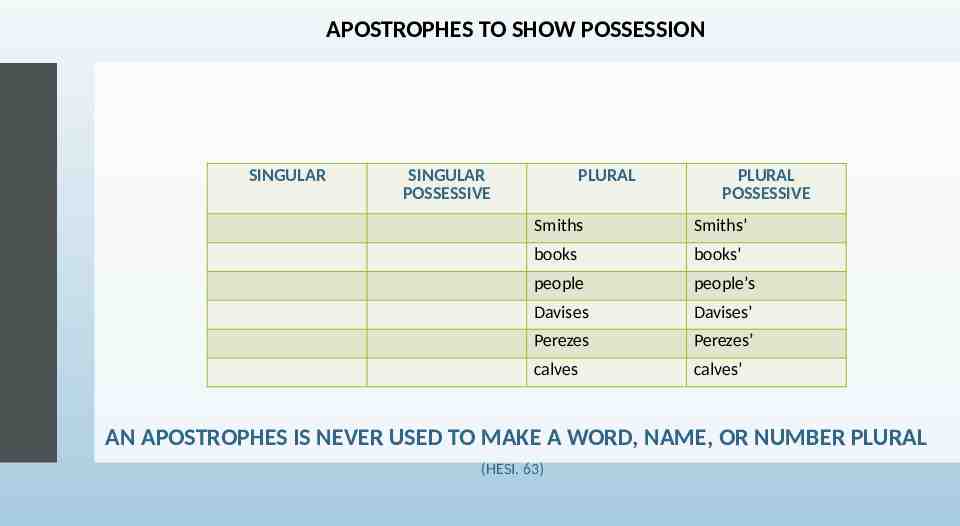
MISPLACED MODIFIERS Is there a misplaced modifier in this sentence? If yes, how would you correct this? Tom served burgers to his guests on paper plates. Correction: Tom served burgers on paper plates to his guests.
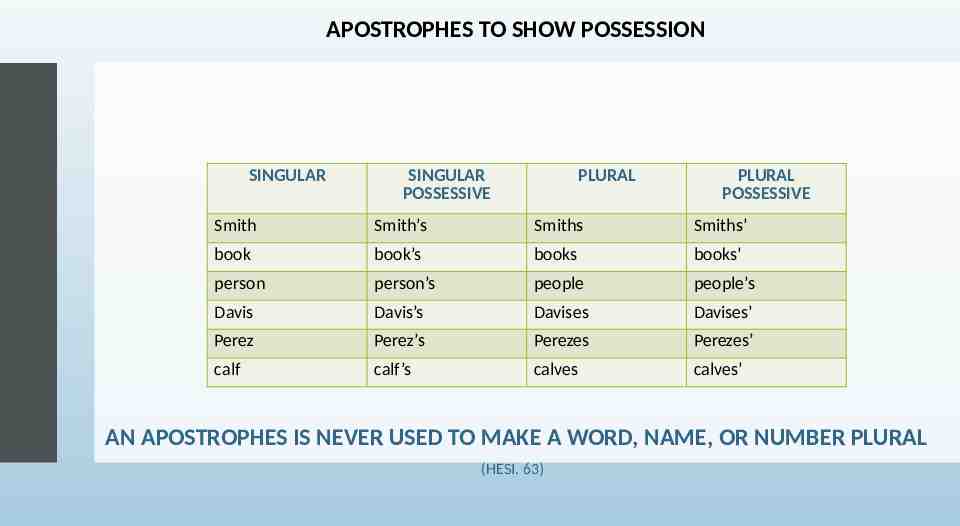
Be Familiar With

PARTS OF SPEECH Become familiar with the 8 parts of speech and their variations. You may be asked to identify a specific part of speech within a sentence. https://assets.ltkcontent.com/images/11023/eight-parts-speech 0066f46bde.jpg
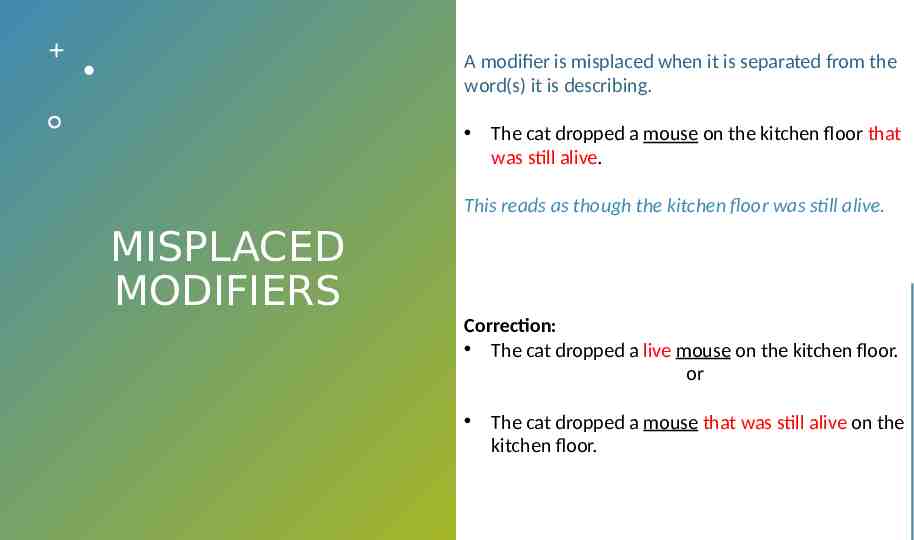
PARTS OF SPEECH Find an example of each of these parts of speech in this sentence. My elderly father drove slowly down the winding road. Adverb: Adjective: Noun: Verb: Pronoun:
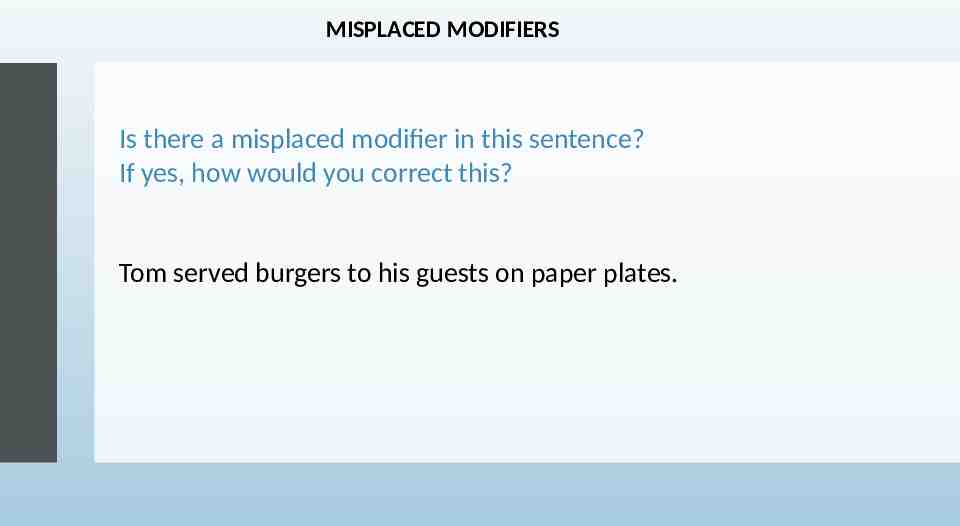
PARTS OF SPEECH My elderly father drove slowly down the winding road. Adverb: slowly Adjective: Noun: Verb: Pronoun:
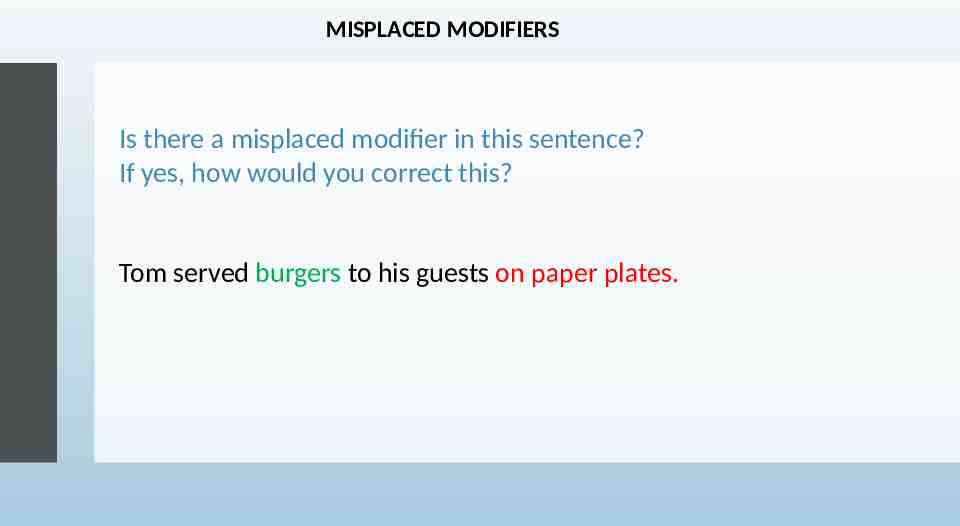
PARTS OF SPEECH My elderly father drove slowly down the winding road. Adverb: slowly Adjective: elderly, winding Noun: Verb: Pronoun:
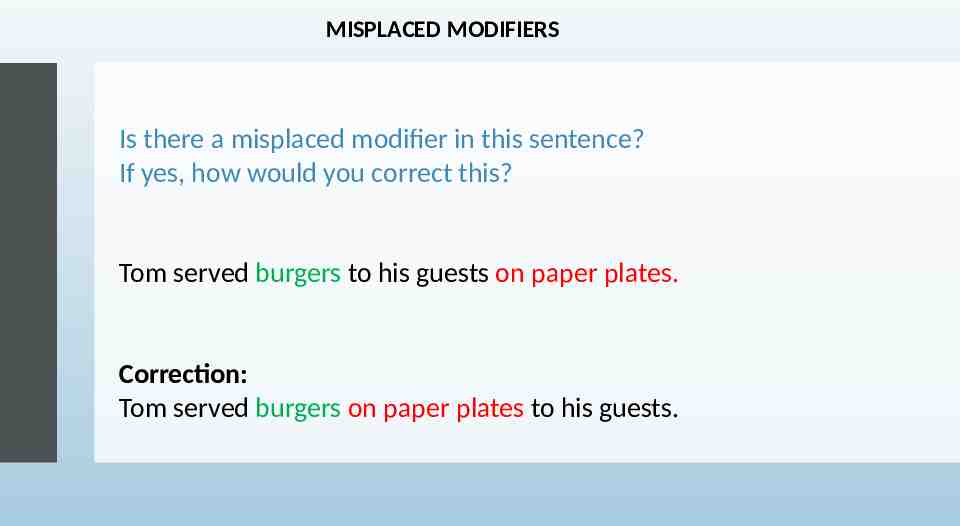
PARTS OF SPEECH My elderly father drove slowly down the winding road. Adverb: slowly Adjective: elderly, winding Noun: father, road Verb: Pronoun:

PARTS OF SPEECH My elderly father drove slowly down the winding road. Adverb: Adjective: Noun: Verb: Pronoun: slowly elderly, winding father, road drove

PARTS OF SPEECH My elderly father drove slowly down the winding road. Adverb: Adjective: Noun: Verb: Pronoun: slowly elderly, winding father, road drove my
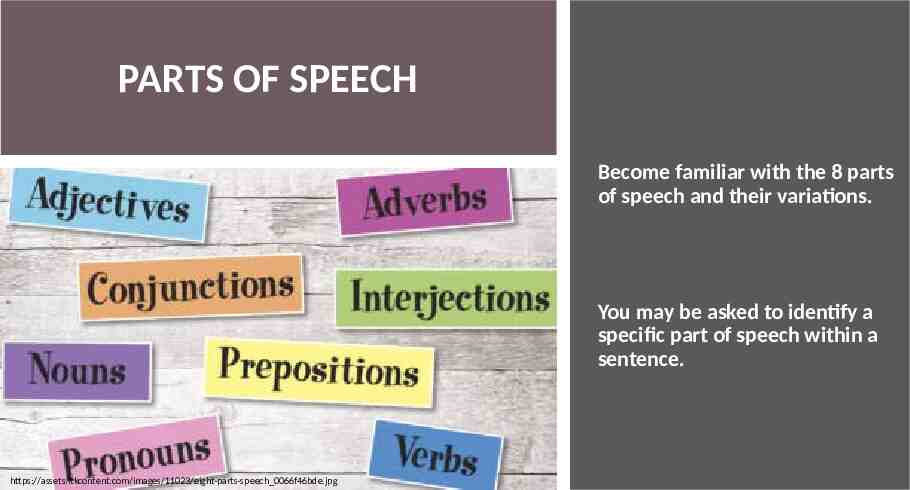
PARTS OF SPEECH My elderly father drove slowly down the winding road. Adverb: Adjective: Noun: Verb: Pronoun: slowly elderly, winding father, road drove my
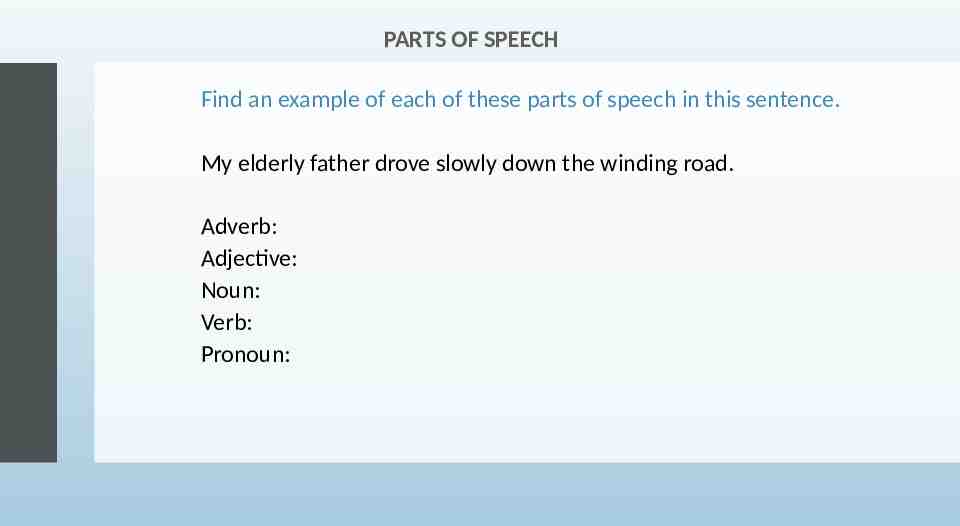
Grammar Terms INDEPENDEN T CLAUSE DEPENDENT CLAUSE PHRASE SENTENCE SUBJECT PREDICATE DIRECT OBJECT INDIRECT OBJECT PREDICATE ADJECTIVE PREDICATE NOMINATIVE
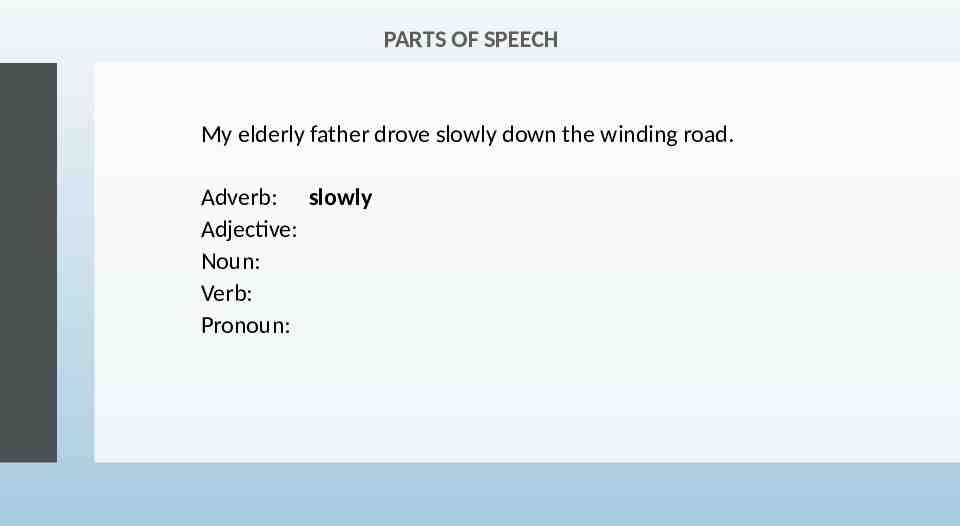
Grammar Terms An independent clause is a complete sentence. It has a subject, predicate and complete thought. We both went to class last night A dependent clause has a subject and predicate but does not form a complete thought. Although we both went to class last night. HINT: Words like after, because, before, until, since, while, etc. introduce dependent clauses (HESI. 60). Phrase – Direct Object – Indirect Object – Predicate Adjective – Predicate Nominative
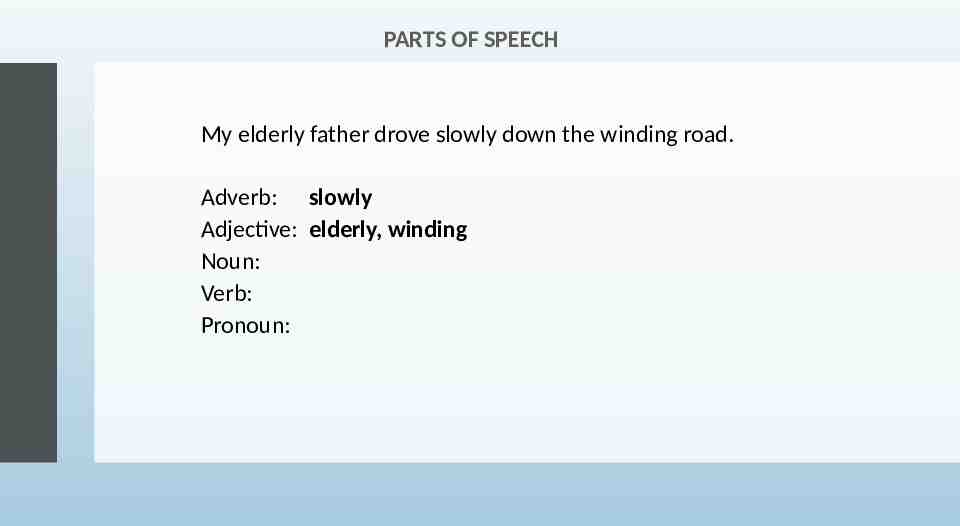
Grammar Terms Find an independent clause. 1. She was scheduled to work. 2. Because she didn’t feel well. 3. However the dog kept barking. 4. While you were sleeping. HINT: Look for the complete thought.
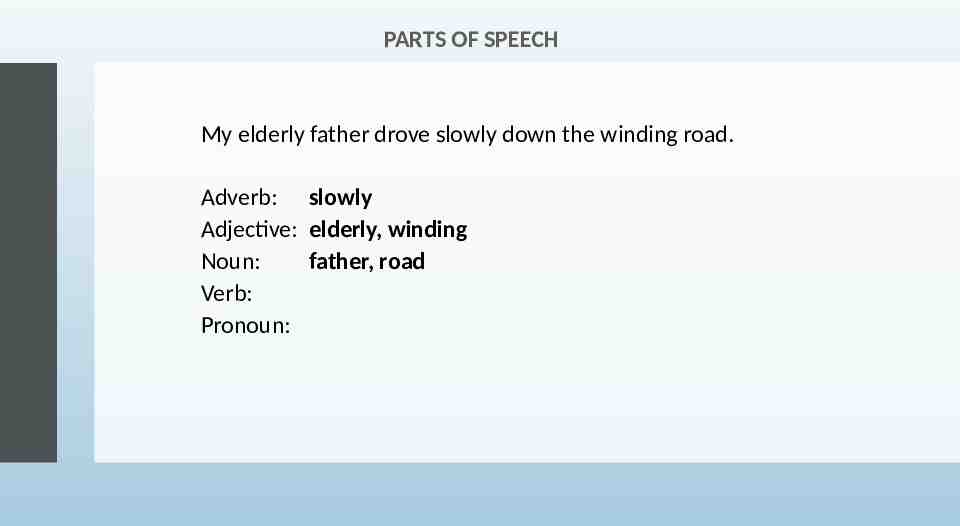
Alphabetical Order List the following words in alphabetical order: bade, badly, bad, badger, badge, badminton
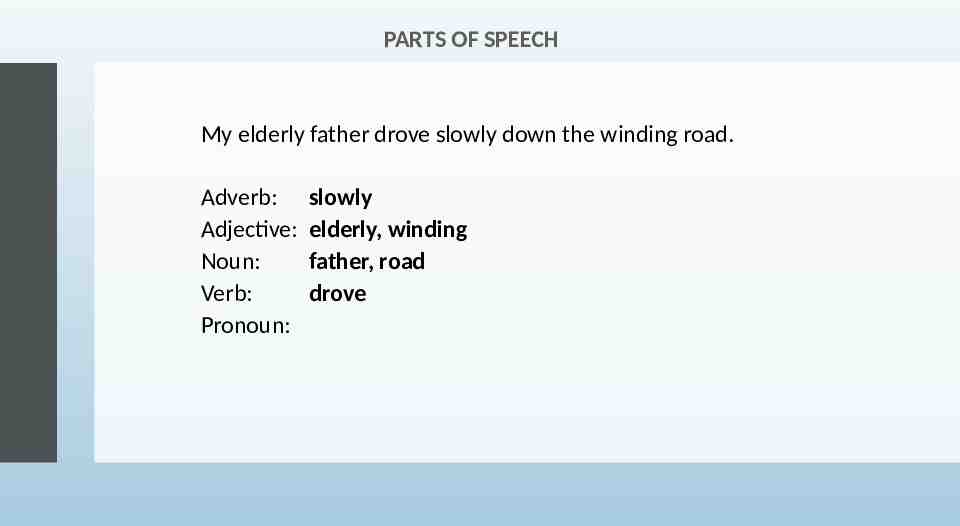
Alphabetical Order B B B B B B a a a a a a d d d d d d e l y g e g e m i r n t o n
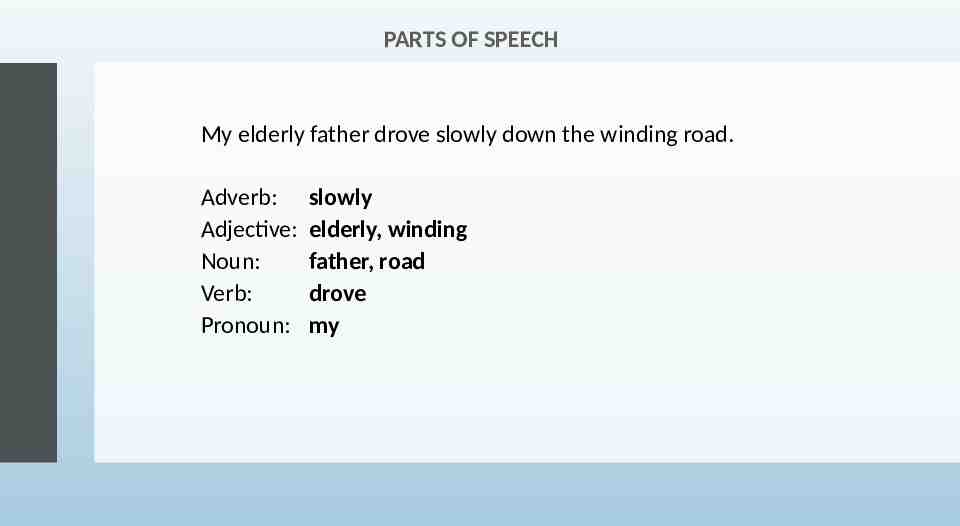
Alphabetical Order List the following words in alphabetical order: forget, form, fork, former, fort, forge
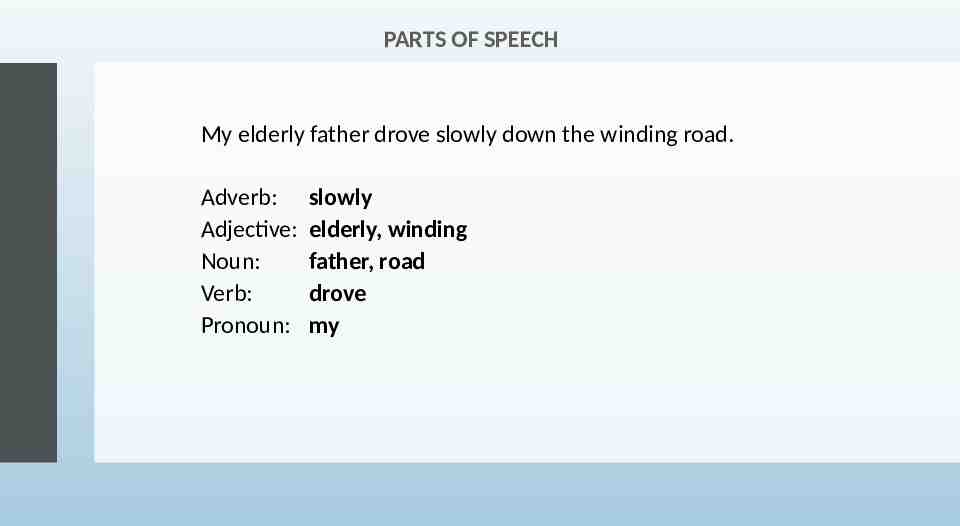
Alphabetical Order F o r g e t F o r m F o r k F o r m e r F o r t F o r g e
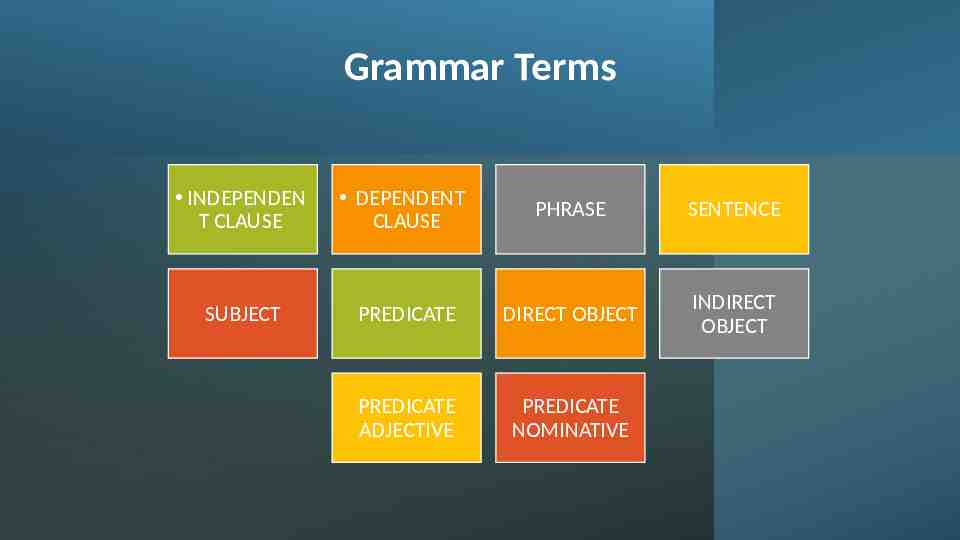
Alphabetical Order 1. forge F o r g F o r m F o r k F o r m e r F o r t F o r g 2. forget e t e 3. fork 4. form 5. former 6. fort
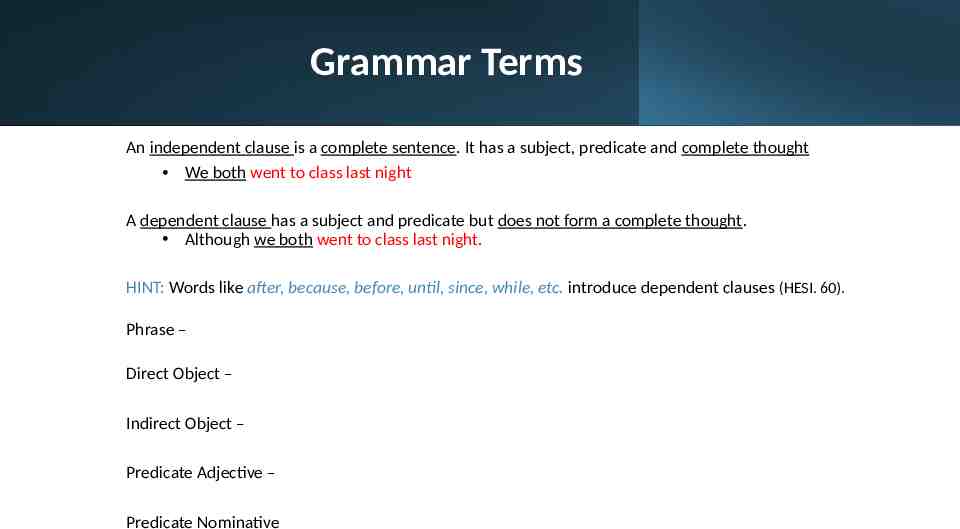
You don’t need to study everything. Take a HESI practice test. RECOMMENDED STUDY STRATEGY Notice your strengths and areas that need improvement. Practice the individual skills that need improvement. Retake a practice test and check for improvement.
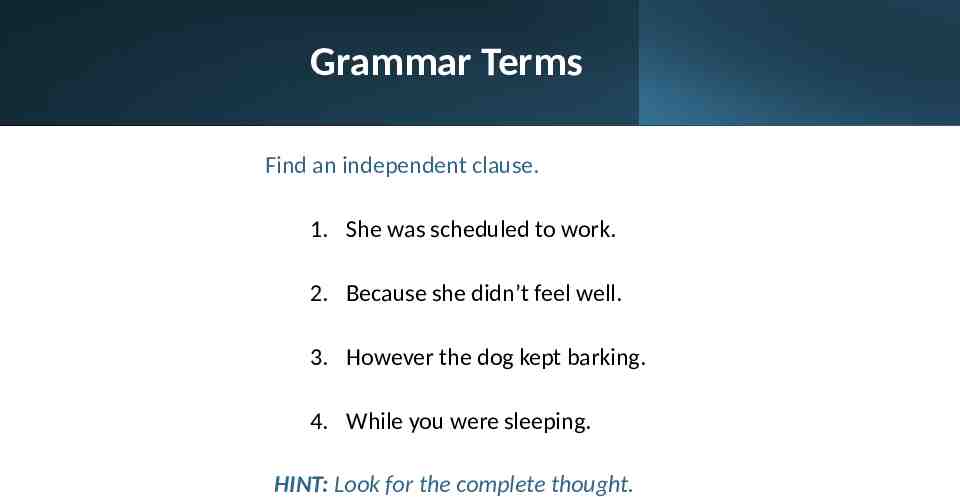
Where can I get a mini-lesson if I need it? RECOMMENDED STUDY STRATEGY Purdue OWL Grammarly Blog Grammar Girl's Quick and Dirty Tips for Better Writing Search You Tube for Videos Grammarbook.com

Where Can I Practice Grammar and Vocabulary? RECOMMENDED STUDY STRATEGY Quizlet.com Search HESI Grammar or HESI Vocabulary Use flashcards or create quizzes Cengage Learning offers online grammar quizzes https://softschools.com/quizzes/grammar/ Google a specific skill with the word worksheet or practice Apostrophe practice
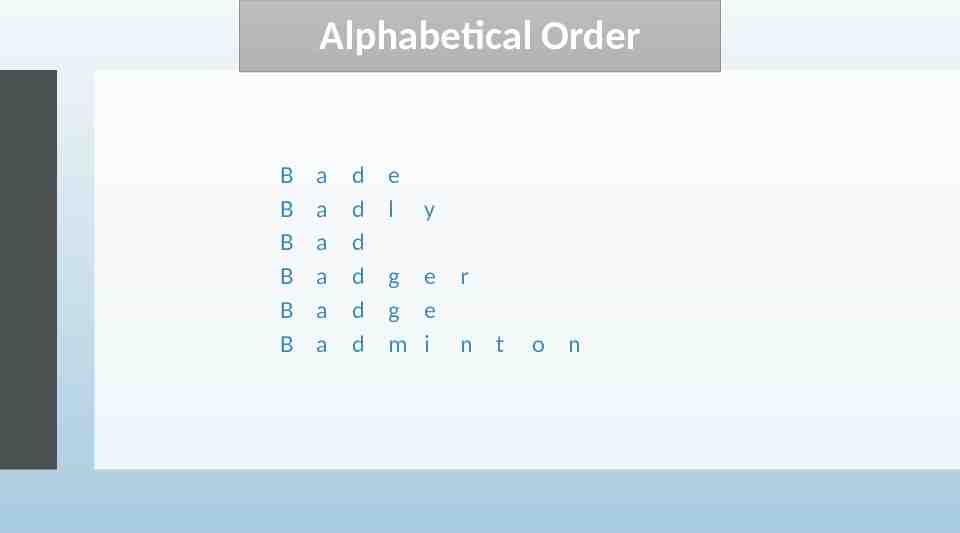
Where can I take a HESI A2 Practice Test? https://nursehub.com/free-hesi-a2-practice-test/ RECOMMENDED STUDY STRATEGY https://www.proprofs.com/quiz-school/topic/hesi Can be set to flashcards or quiz https://www.hesia2practicetest.com/ https://uniontestprep.com/hesi-exam/practice-test https://www.test-guide.com/free-hesi-a2-practicetests.html
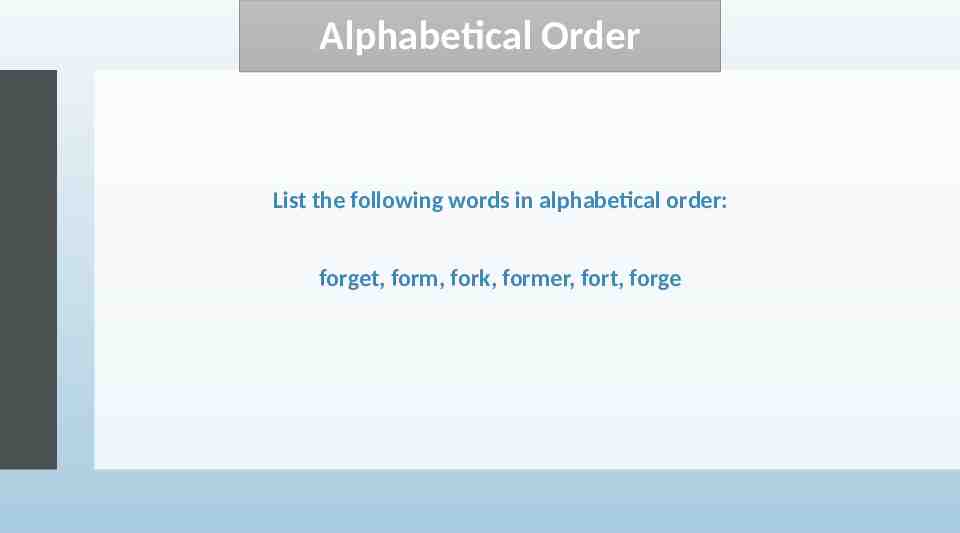
Allen, Shundalyn. “Laying vs. Lying (Lay vs. Lie)–What’s the Difference?” Grammarly Blog, Grammarly Inc., 2021, www.grammarly.com/blog/lay-lie/? &utm source google&utm medium cpc&utm campaign 10273012991&utm targetid aud-834333299496:dsa- WORKS CITED 1233402314764&gclid EAIaIQobChMIqKKymPDY7wIVaE1yCh0UuADTEAAYASAAEgIlr D BwE&gclsrc aw.ds. ---. “Which vs. That: How to Choose.” Grammarly Blog, Grammarly Inc., 2021, www.grammarly.com/blog/which-vs-that/? &utm source google&utm medium cpc&utm campaign 10273012991&utm targetid aud-834333299456:dsa1233402314764&gclid EAIaIQobChMIpMTGtund7wIVhuazCh01TAa4EAAYASAAEgLHpvD BwE&gclsrc aw.ds. ---. “Who vs. Whom.” Grammarly Blog, Grammarly Inc., 6 Apr. 2021, www.grammarly.com/blog/who-vs-whom-its-not-ascomplicated-as-you-might-think/? &utm source google&utm medium cpc&utm campaign 10273012991&utm targetid aud-368908430844:dsa1233402314764&gclid EAIaIQobChMIxeL hM p7wIVGrbICh09jwmgEAAYASAAEgKuyfD BwE&gclsrc aw.ds. Aronoff, Wendy. “HESI Study Guide for Reading Comprehension, Vocabulary & Grammar.” Prepared for CCRI Student Success.
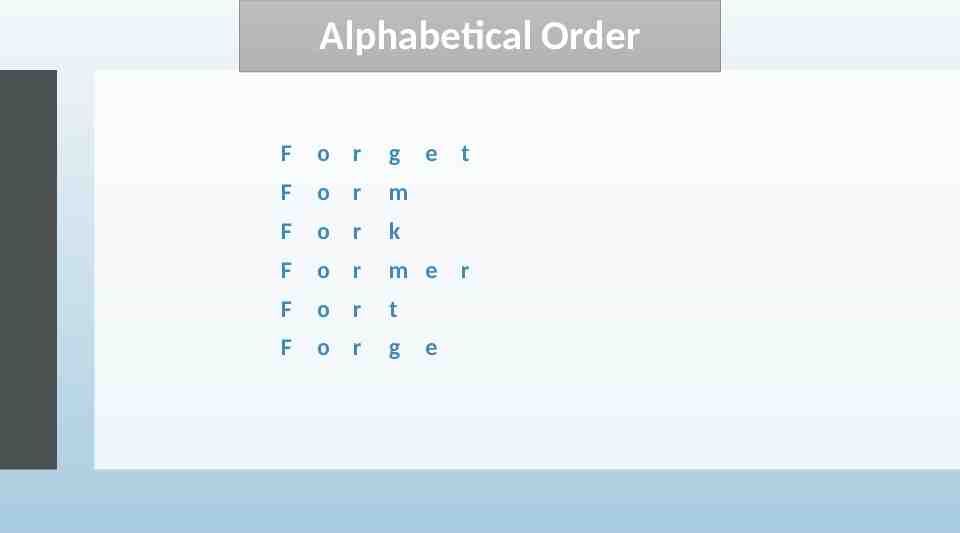
Dictionary.com. “‘Affect’ vs. ‘Effect’: Use The Correct Word Every Time.” Dictionary.Com, 19 Jan. 2021, www.dictionary.com/e/affect-vs-effect. Fogarty, Mignon. “‘Lay’ Versus ‘Lie.’” Quick and Dirty Tips, 19 Apr. 2018, www.quickanddirtytips.com/education/grammar/lay- WORKS CITED versus-lie. HESI. Admission Assessment Exam Review E-Book. 5th ed., Kindle ed., Houston, TX, Elsevier, 2021. Luo, Amy. “Misplaced Modifiers and How to Fix Them.” Scribbr, 5 Jan. 2021, www.scribbr.com/language-rules/misplacedmodifier. Penn, Jordan. “Apostrophe The Punctuation Guide.” TPG, 2021, www.thepunctuationguide.com/apostrophe.html. Traffis, Catherine. “What Is a Coordinating Conjunction?” Grammarly Blog, Grammarly Inc., 2021, www.grammarly.com/blog/coordinating-conjunctions/? &utm source google&utm medium cpc&utm campaign 10273012991&utm targetid aud-866080197834:dsa1233402314764&gclid EAIaIQobChMIyOfkjefn7wIVlMDICh3qHAZHEAAYASAAEgL7F D BwE&gclsrc aw.ds. “Unclear Pronoun Reference.” EnglishComposition.Org, 2021, englishcomposition.org/essential-writing/unclear-pronoun-reference.
